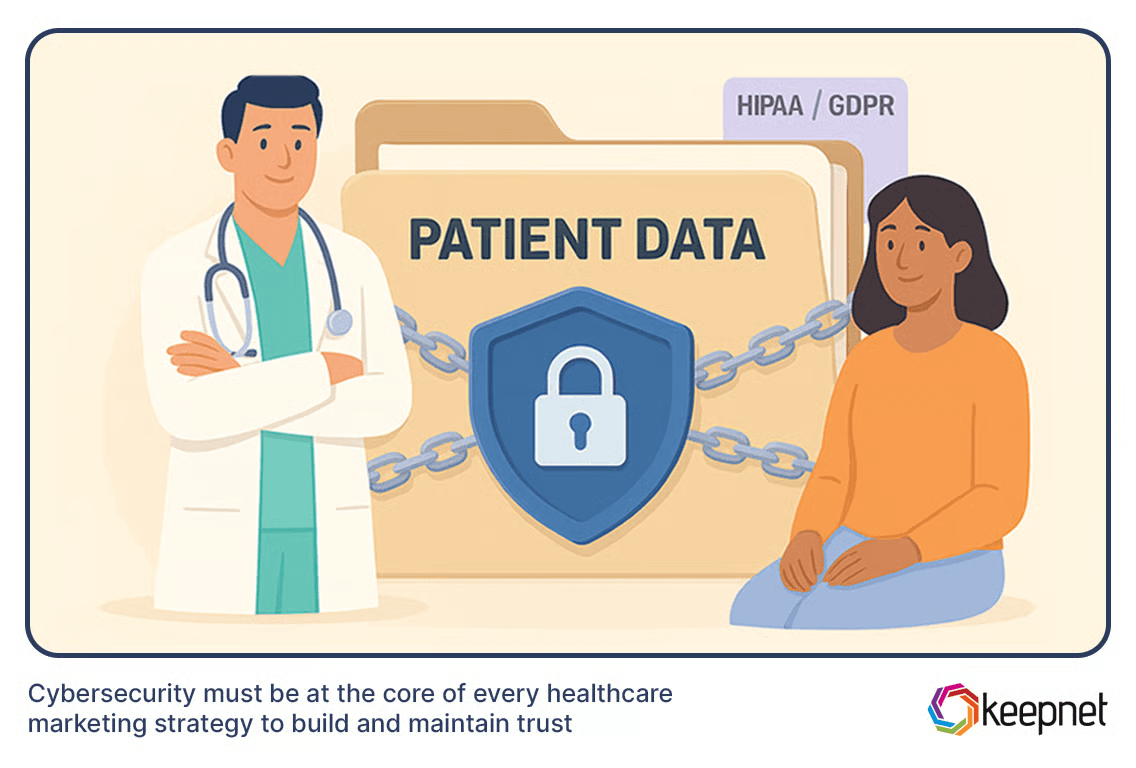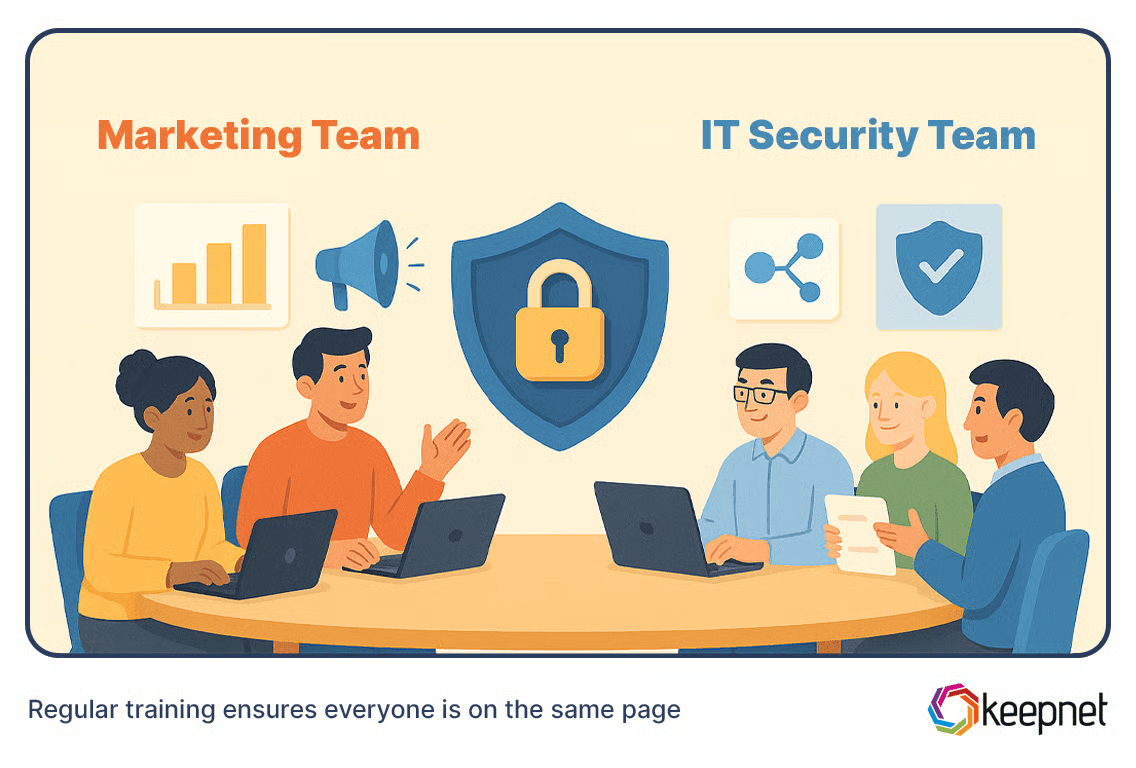Why Cybersecurity Should Be at the Core of Every Healthcare Marketing Strategy
Cybersecurity is no longer optional in healthcare marketing. With phishing causing 70% of data breaches and millions lost per incident, this blog explores why marketers must prioritize cybersecurity to protect patients, comply with regulations, and build trust.
Healthcare marketers are under mounting pressure to deliver personalized, data-driven campaigns—but this urgency comes with high stakes. The healthcare sector is a prime target for phishing: in 2022, phishing was cited as the leading entry point for cyberattacks, responsible for 40% of all initial infection vectors according to HIPAA Journal. Shockingly, 70% of healthcare data breaches originate from phishing, and the average cost per incident now hovers around $9.23 million (Source).
With 88% of healthcare workers admitting to clicking on phishing emails (Source), the human element remains a critical vulnerability. At the same time, the stakes extend well beyond financial loss—67% of healthcare organizations report that phishing and business email compromise directly harm patient care quality according to Dialog Health.
In this high-risk landscape, cybersecurity can’t be an afterthought—it must be the backbone of every marketing strategy. Safeguarding patient data not only protects your brand but also preserves the trust and well-being of those you serve.
The Growing Threat of Cyberattacks in Healthcare Marketing
The healthcare industry has long been a prime target for cybercriminals, and marketing teams are no exception. Marketing databases filled with patient data, from medical histories to behavioral patterns, are a goldmine for attackers. In today’s digital landscape, cybersecurity is more than just a precaution — it’s an absolute necessity.
Data breaches not only result in financial losses, but they can also cause irreparable damage to brand reputation, especially when the personal details of patients are compromised. Securing this data is an essential part of building a trusted healthcare brand, and any failure in this area can result in legal consequences, loss of trust, and severe financial repercussions.
Why Healthcare Marketers Must Prioritize Cybersecurity in Campaigns
Marketers frequently work with vast amounts of sensitive patient data, often through CRM systems, email marketing, and analytics tools. The risk of data exposure increases when these systems are not adequately secured. Cybersecurity should not be viewed as a responsibility reserved for IT teams alone — it must be ingrained in every aspect of marketing strategy. Secure handling of data should guide every decision, from how personal information is collected to how it’s used in campaigns.
If cybersecurity isn’t prioritized in daily marketing operations, even the best campaigns could be compromised by a simple breach. Integrating cybersecurity measures ensures marketers can confidently reach their target audience while keeping sensitive data safe.
The Legal and Ethical Responsibility of Securing Patient Data
Healthcare marketing teams are responsible for handling some of the most sensitive data in existence. With the increasing number of data privacy regulations like HIPAA and GDPR, the consequences of mishandling this data can be severe. But beyond the legal obligations, protecting patient data is also an ethical responsibility.
For example, campaigns that involve high-risk services like detox or treatment centers require extra care when handling sensitive patient information. In these cases, protecting patient data isn’t just a regulatory necessity; it’s a key element of maintaining trust in the healthcare system. Patients entrust their personal information to healthcare providers, and breaches not only violate their privacy but also erode confidence in the entire healthcare system.

Building Consumer Trust Through Robust Cybersecurity Practices
Trust is the cornerstone of any successful healthcare marketing campaign. In an era where patients are increasingly aware of the risks to their personal data, strong cybersecurity practices are essential for gaining and retaining their trust. Transparent communication about how their data usage, coupled with clear privacy policies, helps reassure patients that their information is secure.
Implementing advanced cybersecurity measures, such as encryption, secure forms, and two-factor authentication, demonstrates to patients that their safety is a priority. When patients trust that their data is safe, they are more likely to engage with marketing campaigns and share personal information, which leads to better marketing results.
The Role of Technology in Securing Healthcare Marketing Data
Technologies such as secure data encryption, firewalls, and privacy-focused email platforms are vital for protecting sensitive data. However, securing this information requires more than just adopting these tools. Many healthcare organizations are now turning to solutions like chatbot security training to raise awareness among staff and ensure they understand potential threats.
While these tools are essential, ongoing monitoring and staff training on best practices in cybersecurity are just as critical. Ensuring that cybersecurity measures are in place at every step of a marketing campaign’s lifecycle helps to reduce the risk of data breaches and protect patient privacy.
Balancing Personalization with Cybersecurity
Personalization has become a staple in healthcare marketing, helping organizations deliver targeted content that resonates with patients. But when marketers use sensitive data to personalize campaigns, they must ensure that their cybersecurity measures can accommodate this level of detail without compromising patient privacy.
One solution is to anonymize or aggregate personal data, reducing the risk of exposure while still enabling effective personalization. Transparent communication with patients about how their data will be used — and how it will be protected — helps establish trust.
Collaboration Between Marketing and IT Security Teams
In many organizations, marketing and IT teams work in separate silos, which can lead to gaps in cybersecurity. For example, marketing may gather sensitive patient data, but IT is responsible for protecting it. This division can result in security vulnerabilities that leave data exposed. When marketing and IT teams collaborate, they ensure that every touchpoint in a campaign is secure.
Joint efforts between the two departments help identify potential weaknesses, implement security measures across all platforms, and ensure that all marketing efforts comply with data protection regulations. Cybersecurity requires collaboration at all levels to ensure consistent protection of patient data throughout the entire marketing process.

Training Marketing Teams on Cybersecurity Awareness
Human error is one of the most common causes of data breaches, and marketing teams are no exception. Even the most secure systems can be compromised if staff aren’t properly trained to handle sensitive information. By incorporating cybersecurity awareness into regular marketing training, organizations can empower their teams to spot threats such as phishing attacks or suspicious links.
Many organizations now use tools like security awareness quizzes to measure and improve staff knowledge. Educating teams on best practices in cybersecurity reduces the likelihood of breaches and strengthens the organization’s overall data protection strategy.
Why Cybersecurity Should Be at the Core of Every Healthcare Marketing Strategy
Threats to patient data are constantly evolving. This is why cybersecurity should be at the core of every healthcare marketing strategy. Ensuring that marketing systems are secure and patient data is protected reduces risks and helps maintain compliance with privacy laws.
Investing in cybersecurity technologies, along with staff training and secure vendor relationships, pays off in the long run by preventing costly breaches. Marketers who embrace cybersecurity as a fundamental aspect of their strategy will ensure their campaigns remain effective, their organizations remain compliant, and their patient relationships remain strong.
Build Trust Through Secure Marketing!
Cybersecurity should be at the core of every healthcare marketing strategy to protect patient trust, meet compliance standards, and secure long-term success. Every campaign that uses personal details carries responsibility. Strong cybersecurity is no longer optional — it is central to credibility and growth.
How Keepnet Helps Healthcare Organizations Secure Marketing Strategies
Healthcare marketing teams face unique risks because they handle large volumes of sensitive patient information. Keepnet provides a comprehensive Human Risk Management Platform designed to minimize these risks by addressing both the technical and human factors of cybersecurity.
1. Reducing Human Error with Training and Awareness
Keepnet’s security awareness training equips healthcare marketing teams to recognize and respond to threats like phishing, vishing,, smishing, and QR code phishing. With gamified learning modules and scenario-based simulations, marketers learn how to spot suspicious emails, malicious links, or social engineering tactics before mistakes happen. This is critical given that human error drives the majority of healthcare breaches.
2. Phishing & Social Engineering Simulations
Marketing professionals often receive outreach emails, partnership requests, and vendor communications that can disguise phishing attacks. Keepnet’s multi-channel phishing simulations (email, SMS, voice, QR, and MFA fatigue) allow organizations to safely test vulnerabilities. By identifying who is most at risk, managers can deliver targeted training to strengthen weak spots and safeguard patient data.
3. Compliance Support for HIPAA & GDPR
Keepnet helps healthcare organizations meet strict regulatory requirements by providing reporting dashboards and automated audit trails that track awareness progress, training completion, and incident response readiness. This ensures marketing campaigns remain compliant with HIPAA, GDPR, and other healthcare privacy regulations while protecting brand credibility.
4. Building a Culture of Trust
Beyond compliance, Keepnet focuses on cultivating a security-first mindset across marketing teams. Regular awareness campaigns, instant feedback after simulated attacks, and engaging content help marketers internalize best practices. This not only protects patient data but also reinforces the trust that healthcare organizations rely on to grow their brand.